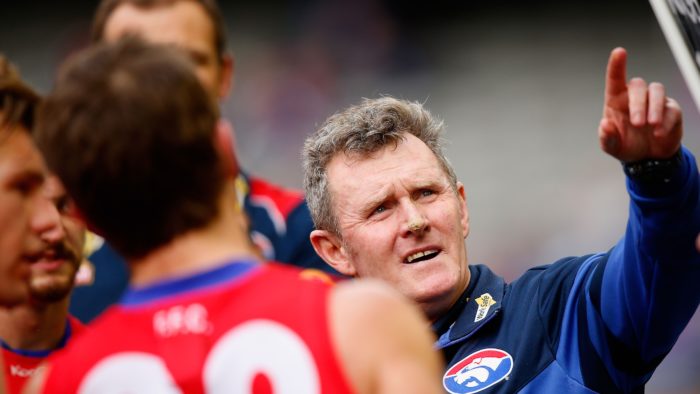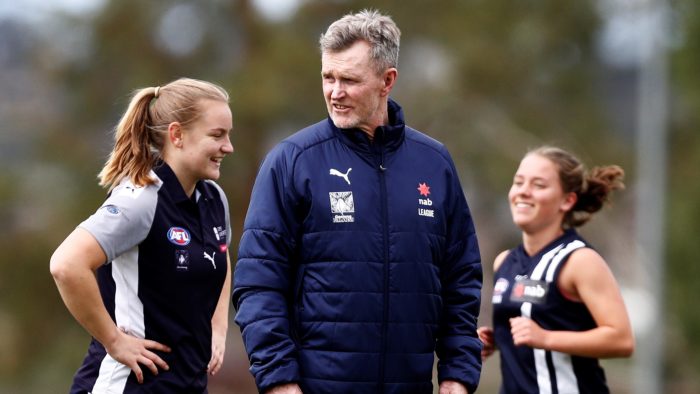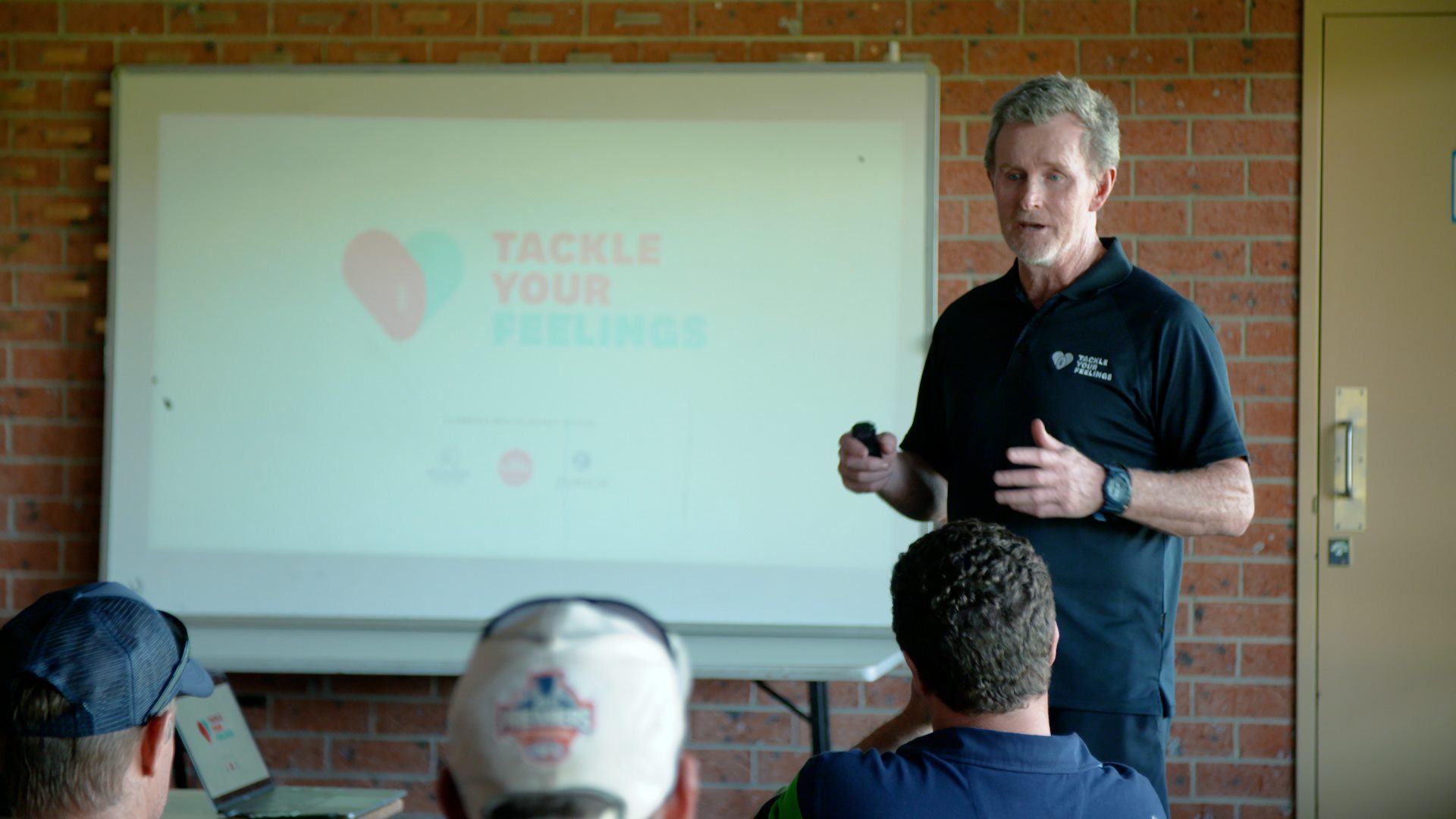After 20 years involved at the elite AFL level, former Western Bulldogs coach Brendan McCartney has learnt a thing or two about building and nurturing relationships.
McCartney, who has joined the Tackle Your Feelings program as an ambassador and program facilitator, said over the course of his career his personal coaching philosophy developed to become more than wins and losses.
“It’s a funny thing for me footy because, as you go up the totem pole, the desire and the pressure to win can overshadow what you often stand for and I found that happening to me a little bit towards the end of my time in the AFL,” he told Tackle Your Feelings.
“You start fooling yourself in a way into how smart you are and how much you know about the game and what is going to impress players and have them believe in what you’re about, but in actual fact the thing they want from you is respect, encouragement and a positive role model to work around.”

McCartney, who hails from Nyah (a small town in northern Victoria), began coaching in the Geelong Football League after a persistent injury curtailed his local playing career for the Newtown and Chilwell Football Club and resulted in his retirement at age 27.
From there, McCartney rose up the ranks of local football to become the head coach of the Ocean Grove Football Club.
During his time coaching the ‘Grubbers’, McCartney led the side to three consecutive premierships.
His success as a coach at the community level quickly put him on the radar of AFL clubs, with Richmond offering McCartney a position as an assistant and development coach in 1998.
After a 13-year apprenticeship as an assistant coach at various AFL clubs (Richmond, Geelong and Essendon), McCartney was announced as the senior coach of the Western Bulldogs ahead of the 2012 season.
Three seasons later, McCartney resigned as the senior coach and joined Melbourne as a development and strategy coach.
Despite the media scrutiny and challenges associated with AFL football, McCartney said his experiences allowed him to expand his understanding of coaching through various strands, particularly in his current role as the coach of the Geelong Falcons’ NAB League Girls team.
“I think it’s been the full progression for me (community football to AFL, then returning to community football) and now I’m back with the under-18 girls at Geelong… They don’t really care what I’ve done or how long I’ve been in the game, but the most important thing is that I care about them,” he said.
If there was one thing McCartney wish he knew in 1987 when he started coaching that he knows now it would be to focus on the importance of relationships with players.
By his own admission, McCartney said he moved away from that focus at various stages throughout his coaching career and towards an “all-imposing desire to win and become a strong club on-field”.

The Tackle Your Feelings program’s focus on understanding, recognising and managing the signs of mental health and the importance of building and nurturing relationships is one of the reasons McCartney joined the program.
“I think back in the day coaches got grumpier as they got older, but now it’s more of a trend towards an empathetic viewpoint and understanding the differences between people and getting more connected in a team,” he said.
“I see it as a bit of a progression to where I’ve headed in my journey in coaching and a passion to give back to the game.
“(The program) is about the critical role that clubs can play in the wellbeing of the people that are involved with the group and that’s why I’m passionate about it,” he said.
In his six months with Tackle Your Feelings, McCartney has visited drought-affected regional areas in Jerilderie and Coleambally (in the NSW Riverina region) and connected virtually with bushfire affected regions in Victoria’s north east and Gippsland.
Being a country boy and having entrenched himself in Geelong’s community, McCartney understands the importance of connecting with those around you.
“Unlike a lot of other parts of Australia, everyone (in regional towns) knows each other and more often than not, are connected through a sporting club,” he said.
“You inherently know more about each other’s lives and you find time for other people.”
In times of crisis or natural disaster, this connection is strengthened and critical to overcoming hardship, according to McCartney.
“In times of a crisis, it’s not a hardship to help because you already have a deep respect and affection for those being affected,” he said.
“Your natural instinct is to jump in and support each other – the people who you’ve grown up with, worked with or played sport with.”
Having been involved in some level of football for more than 40 years, McCartney is using his own learnings and experience to promote the importance of what the Tackle Your Feelings program aims to educate people about.
“Sporting and football clubs have a way of looking after one another,” he said.
“Us ‘average’ people can all do our bit, you don’t have to have the word ‘coach’ by your name to bring people together.”
McCartney believes that’s why the TYF program is critical during this time.
With the uncertainty surrounding COVID-19 and, for many leagues seeing their seasons cancelled or in jeopardy, it’s more important than ever to stay connected.
“(The program) gives coaches and others involved clubs the tools to understand, recognise and manage signs of mental health in their club and then going even broader than that to the wider community,” he said.
“What I love is the ease of understanding everything that we teach… It puts things on the table, but is not confronting, instead it’s supportive and it’s human.
“There is no shame or judgment to it. It’s there, it’s real, and it’s about supporting each other.”


